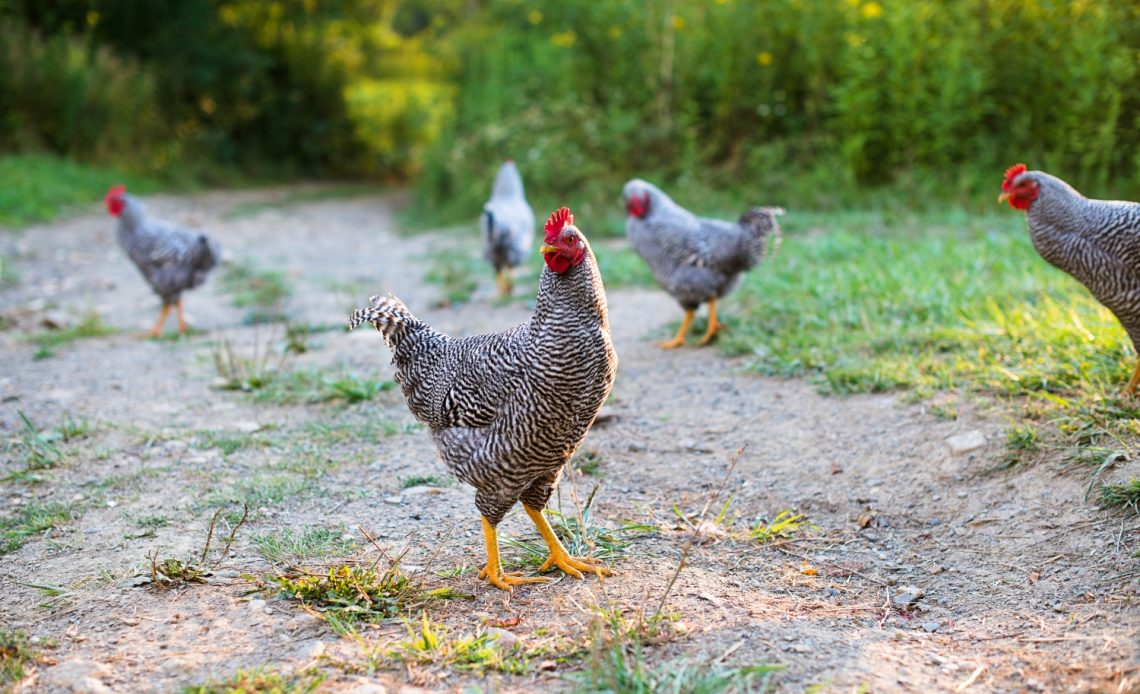

We’re here to help! Wild Yards is a completely free website that is 100% dedicated to helping you create a wildlife-friendly, sustainable yard. Read more
WildYards is reader-supported. When you buy a product through a link on our site, we may earn a comission. Every product is independently selected by our (obsessive) editors and our reviews are unbiased and objective. Read more about our mission or our privacy policy.
Whether you keep chickens and rabbits for pets or for food, meeting their nutritional demands is critical to their well-being. Both of these animals eat many of the same foods. Rabbits and chickens rely on lots of fresh vegetation to stay healthy and offering them prepackaged commercial feed is a great way to ensure they get all of the vitamins and minerals they need to thrive. If you’re in a pinch and you’ve run out of chicken feed, you may be wondering, can chickens eat rabbit food?
Yes, chickens can eat rabbit food, including alfalfa pellets and timothy pellets. However, rabbit food is not a fit substitute for actual chicken feed. While it’s safe to offer rabbit food to your flock occasionally, it should play only a small part in their diet, which should mostly consist of fruits, vegetables, grains, and seeds.
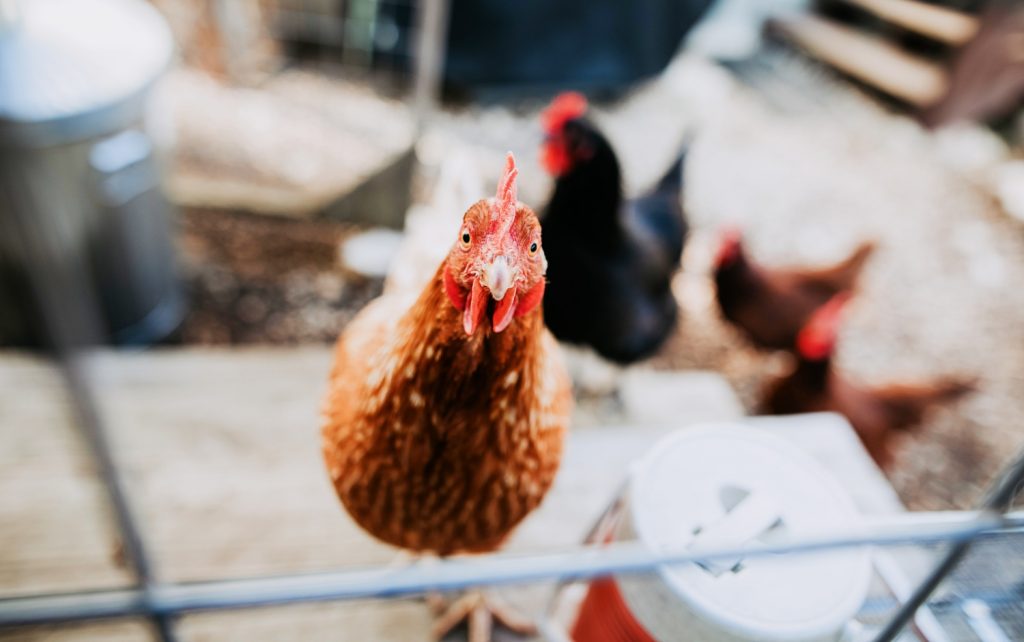
Is it safe for chickens to eat rabbit food?
Maybe you accidentally dropped a bag of rabbit food on the ground, or maybe you forgot to close the door to the shed and your chickens broke into the food bins. Regardless of how your chickens got hold of your rabbit food, the good news is, it’s perfectly safe for them to consume. So you don’t have to worry.
That said, rabbit food, whether it’s alfalfa pellets, timothy pellets, or mixed pellets, is not an ideal meal replacement for your chickens. Rabbit food is tailored to meet the vitamin, mineral, protein, carbohydrate, and fat needs of (surprise, surprise!) rabbits. While offering your chickens rabbit food occasionally is fine, using it to feed your flock for long periods can lead to detrimental nutritional imbalances that can make them sick.
To help you gain a better understanding of why rabbit food should not be used to replace chicken feed, let’s take a closer look at the nutritional needs of both of these animals.
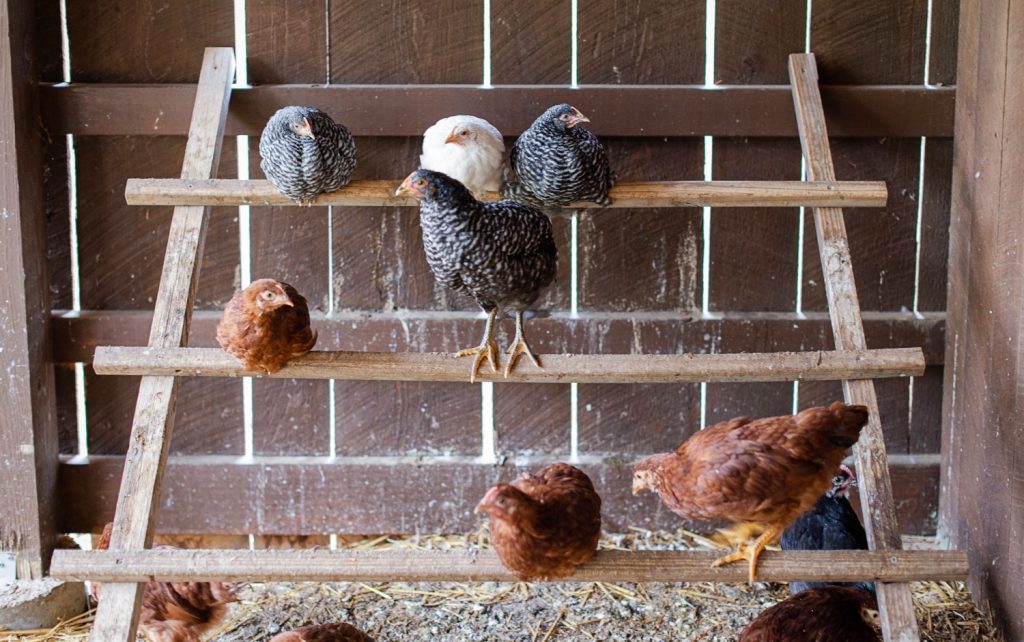
What do rabbits eat?
| Food | Percentage of daily diet |
| Grass and/or hay | 80% |
| Leafy greens | 15% |
| Rabbit food | 4% |
| Fruits | 1% |
Rabbits are herbivores. They rely largely on grasses and leafy green vegetables to survive. Like horses and cows, they spend much of their time eating. Herbivorous animals are often grazers because their foods of choice are so low in calories and nutrients that they must be consumed in large quantities in order to meet the nutritional demands of the animal.
Compared to chickens, rabbits have much higher fiber needs. While rabbits still rely on proteins and fats to stay healthy, they don’t require as much of these two nutrients as chickens do, mostly because rabbits don’t lay eggs.
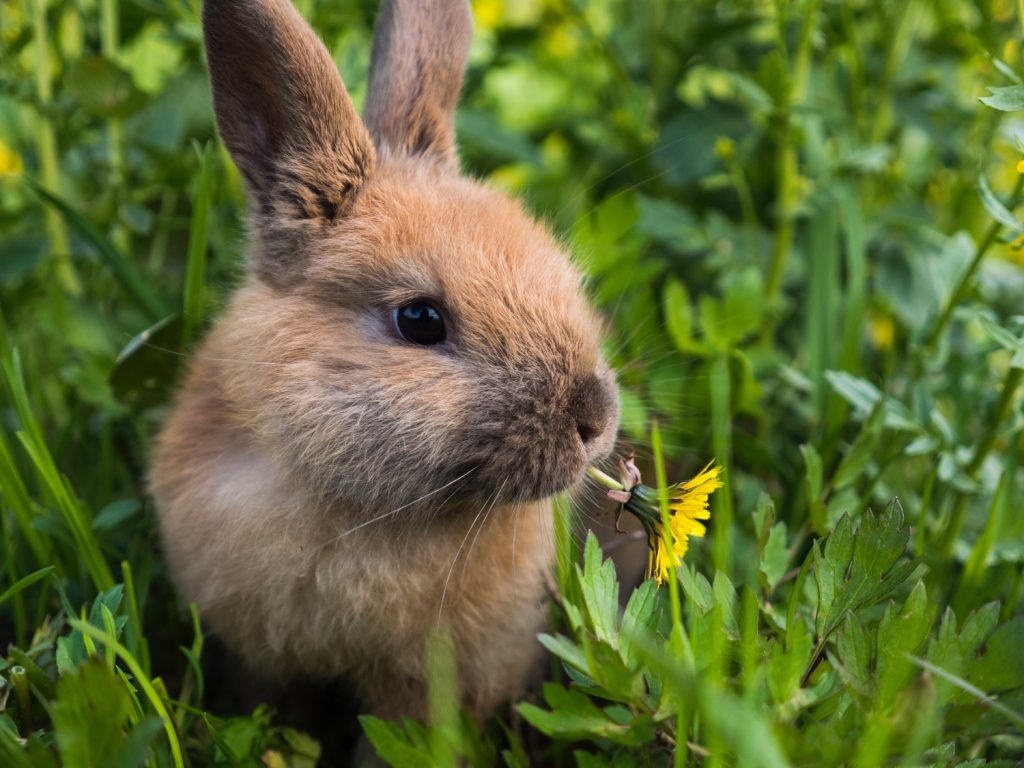
What do chickens eat?
| Food | Percentage of daily diet |
| Chicken food | 70% |
| Grasses | 10% |
| Vegetables and fruits | 10% |
| Protein (insects) | 5% |
| Seeds and grains (scratch) | 4% |
| Grit (crushed oyster shells) | 1% |
Chickens are omnivorous, relying on plants to fulfill their carbohydrate and fiber needs, and insects, small reptiles, and amphibians to meet their protein requirements. Seeds and grains play an integral role in a chicken’s diet as well. They’re an excellent source of fats that chickens need to maintain healthy skin, joints, and plumage.
Because chickens lay eggs, they need a higher percentage of fats and proteins in their diet than rabbits do. Chickens also benefit from a small amount of grit, which helps them digest their foods so they can better utilize the nutrients they contain.
Should you use rabbit food to feed your chickens?
If your chickens just really like the taste of rabbit food, then there’s nothing wrong with giving it to them as a treat. But since rabbit food is formulated for rabbits, you shouldn’t go out of your way to feed it to your chickens.
If your region is going through a drought and there’s very little vegetation for your chickens to browse on, then feeding them alfalfa or timothy pellets designed for rabbits can help fill the gaps in their diet. Mixing rabbit food with chicken scratch and mealworms and tossing the blend around your backyard is a good way to keep your flock entertained. But, otherwise, there are no significant advantages to feeding chickens rabbit food.
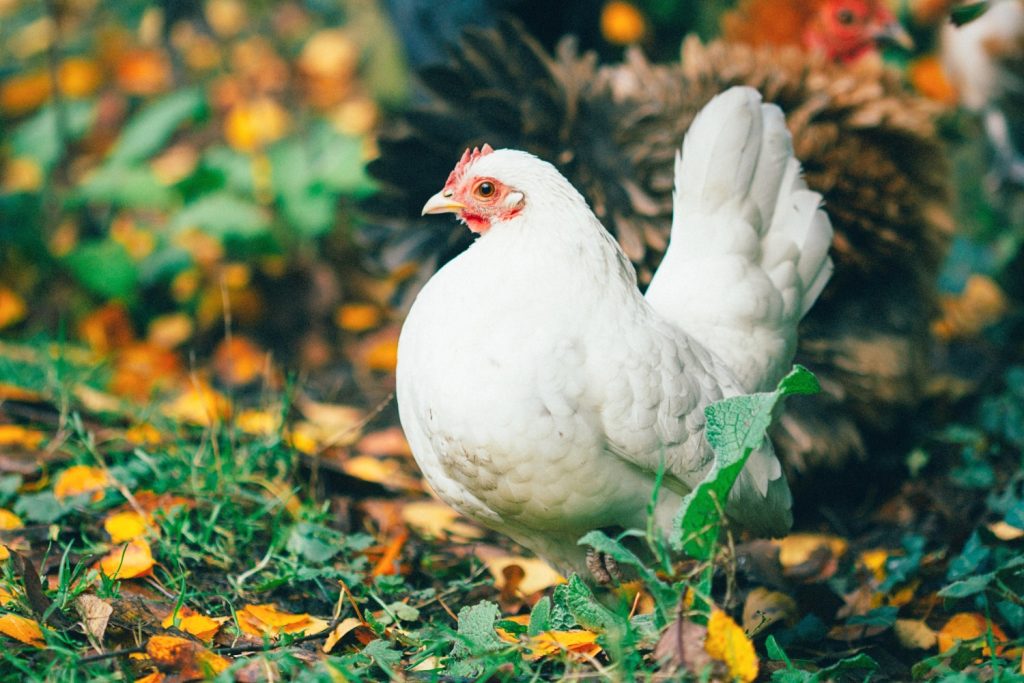
What happens if chickens eat too much rabbit food?
Rabbit foods are high in roughage, so feeding too much to your chickens can lead to protein and fat deficiencies. Chickens may lose weight and become lethargic. Their eyes may lose their brightness and their feathers may become dull and sparse. Laying hens with protein and fat deficiencies will underperform, and the eggs they do produce will have weak shells and lackluster coloring, both inside and out.
It’s also worth noting that rabbits have higher salt requirements than chickens. While chickens rely on salt to keep their electrolytes balanced and to support a healthy appetite, they don’t need as much salt as rabbits do. Signs of salt intoxication in poultry include depression, convulsions, weakness, respiratory distress, and diarrhea. It’s also not unusual for chickens that have ingested too much salt to be found laying on their backs pedaling their feet up in their air.
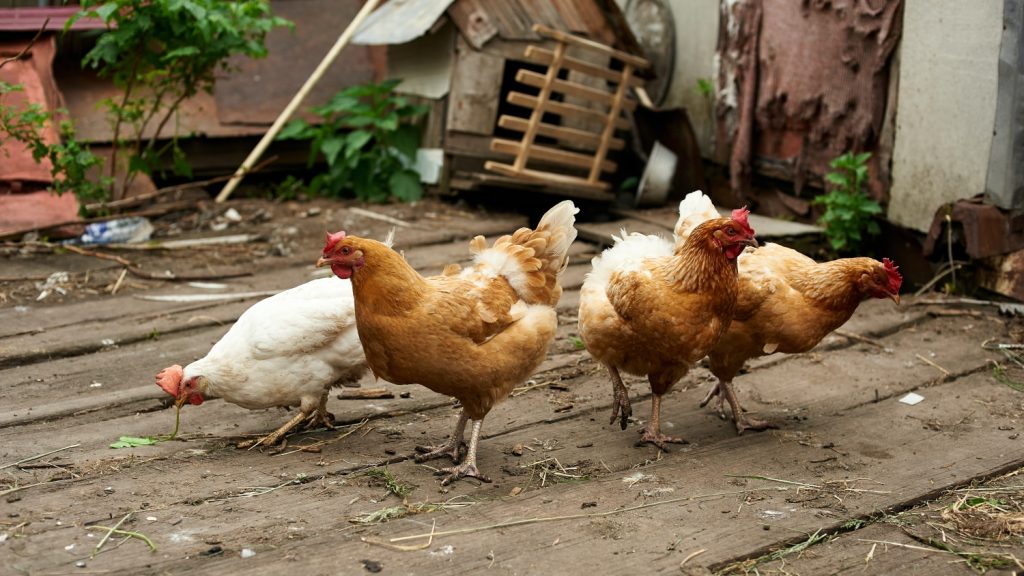
Can baby chicks eat rabbit food?
An egg’s yolk is so nutritionally dense that it can keep a young chick fed for up to three days after it hatches. Your baby chick may not require much food, especially not compared to an adult chicken. But because chicks eat to survive, not just out of enjoyment, what little food they eat needs to be as nutritionally dense as possible to help them grow big and strong.
It won’t hurt your chicks to nibble on a few pellets of rabbit food here and there. But because chicks require more protein and fat than forage, it’s really not a good idea to give them rabbit food on a regular basis. Save the rabbit pellets for when your chicks get older and become more interested in nibbling on green grasses.
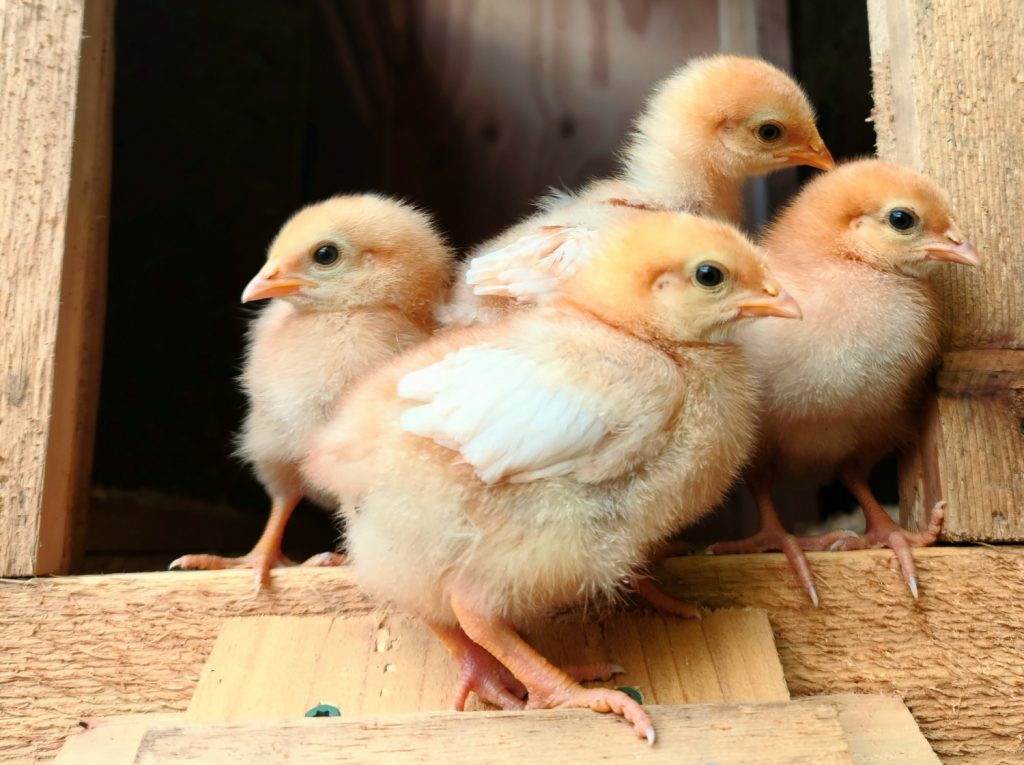
What kind of chicken food should you choose?
Okay, so if you’re not supposed to use rabbit food to feed chickens, then what kind of chicken food should you choose instead? The type of chicken food you feed your flock depends on its purpose. There are three basic feeds for you to pick from.
- Grower feed — Designed specifically for growing chickens, grower feed is a blend of soybean, corn, and wheat fortified with vitamins, including A, B, C, D, E, and K which are essential to healthy development. Many grower feeds also contain beneficial prebiotics and probiotics to improve your chicks’ digestion so they can make the most of the foods they consume. Grower feeds contain around 18% protein to help chicks develop healthy muscles and tissues.
- Broiler feed — If you raise chickens to consume, broiler feed is your best choice. These feeds contain anywhere from 20% to 24% protein to maximize growth. Research shows that soy protein is more absorbable than other types of protein, making soy-based broiler feeds a good choice for flocks meant for consumption.
- Layer feed — Laying hens have greater nutritional needs than roosters and older hens. Layer feeds have higher doses of vitamins and minerals, especially calcium, to help hens produce nutritious eggs. These feeds offer laying hens 16% protein so they can lay more eggs for you to enjoy.
These three main types of chicken feeds should create the foundation of your chickens’ diet, but even within these three categories, you have choices. For instance, some feed companies offer organic options to help keep harmful chemicals out of your chickens’ diet. Fermented chicken feeds are another variety worth keeping an eye out for. These feeds are easier for chickens to digest, and the higher nutrient availability means you get more bang for your buck.
You can also supplement your chickens’ diet with chicken scratch, a mixture of things like wheat kernels and sunflower seeds. Sprinkling chicken scratch around your yard or run encourages that foraging instinct. And keeping a small tray of crushed oyster shells on hand for chickens to eat as grit will help them digest their food throughout the day.
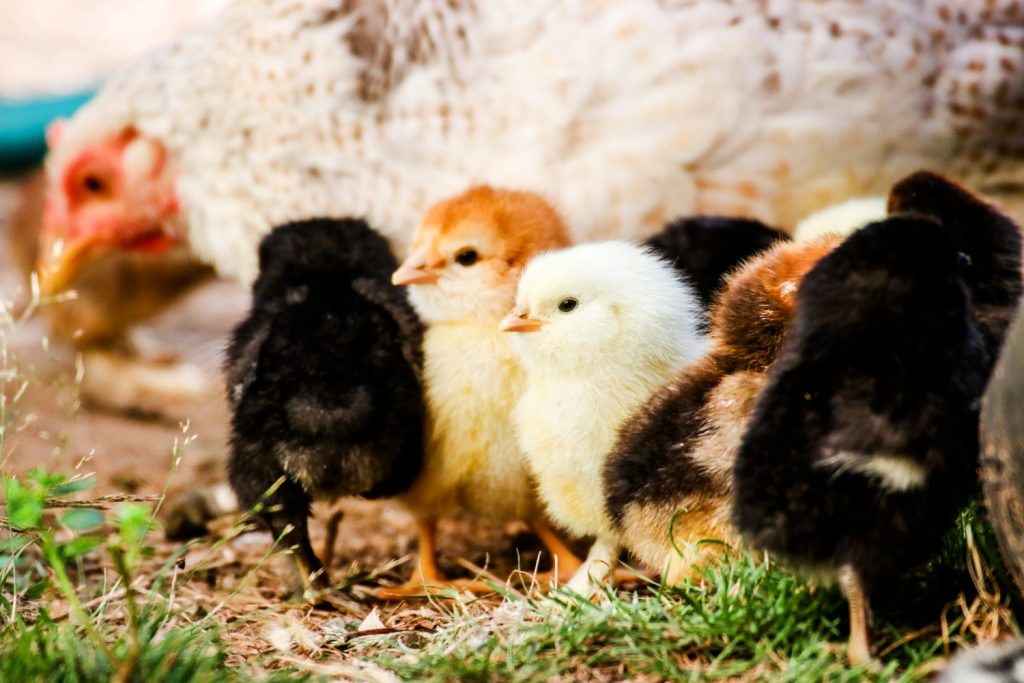
What other kinds of feed can chickens eat?
In addition to rabbit food, chickens can eat cattle feed, sweet feed, horse feed, goat and sheep feed, duck feed, pig feed, and just about any other type of livestock feed. They can also eat birdseed blends and suet cakes, though that probably comes as less of a surprise.
Of course, just because it’s safe for your chickens to consume livestock feeds, that doesn’t mean it’s ideal for them to do so. You should never substitute other feeds for chicken feed in the long term. But if your flock happens to eat the bits of grain your other animals drop at feeding time, you don’t need to worry, either.
What should you feed chickens instead?
If you’re looking for a way to give your chickens more greens, consider feeding them weeds from your flower beds, or vegetables from your garden, like collard greens. You can even feed them table scraps, just avoid feeding chickens citrus fruits, spinach, garlic, onions, avocados, or anything processed or fried.
Chickens rely on a variety of foods to stay healthy. While rabbit food can play a part in the average chicken’s daily diet, it shouldn’t be a major player. Always feed your flock the highest quality of chicken feed possible to keep them in tip-top shape.
